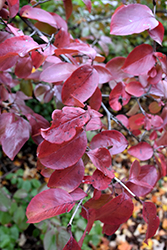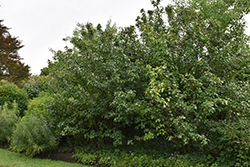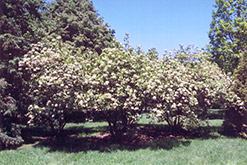It's all about ...
plants

Height: 15 feet
Spread: 12 feet
Sunlight:
![]()
![]()
Hardiness Zone: 5a
Other Names: Southern Blackhaw
Description:
A large multipurpose shrub covered in creamy white flower clusters in spring followed by dark blue-purple berries, fall color ranges from purple to red; excellent as a large hedge or screen, also makes a nice accent plant, flaking older bark is attractive
Ornamental Features
Rusty Blackhaw features showy creamy white flat-top flowers at the ends of the branches in early spring. The deep purple fruits are held in abundance in spectacular clusters from early fall to late winter. It has dark green deciduous foliage. The glossy pointy leaves turn an outstanding purple in the fall. The shaggy gray bark adds an interesting dimension to the landscape.
Landscape Attributes
Rusty Blackhaw is a multi-stemmed deciduous shrub with an upright spreading habit of growth. Its relatively coarse texture can be used to stand it apart from other landscape plants with finer foliage.
This is a relatively low maintenance shrub, and should only be pruned after flowering to avoid removing any of the current season's flowers. It is a good choice for attracting birds to your yard, but is not particularly attractive to deer who tend to leave it alone in favor of tastier treats. It has no significant negative characteristics.
Rusty Blackhaw is recommended for the following landscape applications;
- Accent
- Mass Planting
- Hedges/Screening
- General Garden Use
Planting & Growing
Rusty Blackhaw will grow to be about 15 feet tall at maturity, with a spread of 12 feet. It tends to be a little leggy, with a typical clearance of 2 feet from the ground, and is suitable for planting under power lines. It grows at a medium rate, and under ideal conditions can be expected to live for 40 years or more.
This shrub does best in full sun to partial shade. It is very adaptable to both dry and moist locations, and should do just fine under average home landscape conditions. It is considered to be drought-tolerant, and thus makes an ideal choice for xeriscaping or the moisture-conserving landscape. It is not particular as to soil type or pH. It is highly tolerant of urban pollution and will even thrive in inner city environments. This species is native to parts of North America.
This plant is not reliably hardy in our region, and certain restrictions may apply; contact the store for more information.


